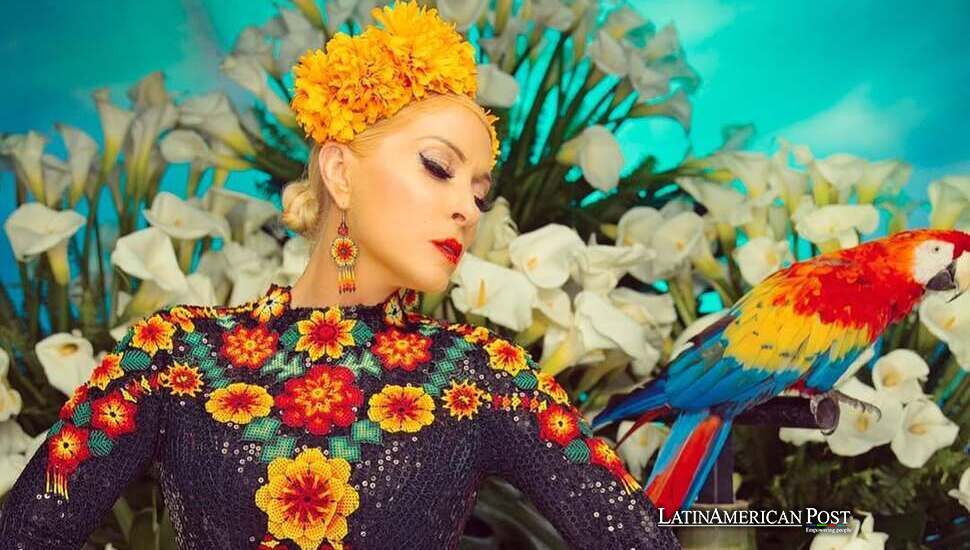Mexican Icon Yuri Embraces Corridos Tumbados if Lyrics Reject Violence and Machismo

Yuri’s latest album, Yuri y sus Amigos del Regional Mexicano, reveals a seasoned pop star eager to explore new styles without sacrificing her core values. As she experiments with fresh sounds, she honors Mexico’s musical heritage and defends women’s dignity.
A Foray into Regional Sounds and Beyond
Yuri, the celebrated Mexican vocalist known for hits like “La maldita primavera” and “¿Qué te pasa?” has taken a daring step with her new album, Yuri y sus Amigos del Regional Mexicano. Though she has dominated Latin pop since her 1979 debut, Ilumina tu vida, she now delves into the robust world of regional Mexican music—especially corridos and norteño influences—while remaining steadfast in her stance against glorifying violence or disrespect for women.
Her incursion into the regional genre began almost three years ago when friends from the industry invited her to collaborate on songs celebrating her 46-year career. Despite initial reservations—she calls regional Mexican music “very strong” and “highly competitive”—she ultimately embraced the opportunity. “I just said, ‘Let’s do it. Better to give it a try than regret not trying at all,'” she explains. That bold leap gave birth to the very album now in fans’ hands.
The project is noteworthy not just for Yuri’s adaptation to a style far removed from the clean pop framework she has spent decades cultivating but also for the array of duets she features. Ángela Aguilar, Paquita la del Barrio (who has since passed away), Carín León, Víctor García, Luis Ángel “El Flaco,” and Edwin Luna—some of the brightest luminaries in regional Mexican—have joined Yuri in blending her vocal flair with the unmistakable flourishes of mariachi and banda.
Even so, Yuri’s gaze stretches beyond conventional regional Mexican boundaries. When asked about corridos tumbados—an emergent style that can include edgy or violent themes—she voices caution. She respects artists who produce these tracks but makes it clear she would only consider participating if the lyrics avoid glorifying violence or objectifying women. “I’d think twice,” she admits. “You can write about heartbreak, you can address betrayal—but I draw the line at celebrating bloodshed or disrespecting women. That’s just not me.”
Though she’s proven her willingness to step outside her comfort zone, Yuri remains rooted in her conviction that musicians and songs bear responsibility for the messages they convey. She values the cultural significance of corridos—a storied narrative tradition in Mexico—but cannot condone content that glamorizes brutality. In her mind, authenticity in music must not come at the expense of moral principles. In other words, she prizes sincerity: If she were to sing a corrido tumbado, it would be in the spirit of genuine heartbreak or personal storytelling rather than promoting destructive themes.
Healing Through Music and Memories
Outside this pivotal new album, Yuri is simultaneously promoting her Icónica Tour, a full-scale live production that revisits her most beloved hits. Spanning an impressive trajectory of nearly five decades, her catalog brims with widely recognized songs, from “Detrás de mi ventana” to “Hombres al borde de un ataque.” Yet for Yuri, revisiting these chapters in her life proved more emotionally taxing than expected. She found herself grappling with memories tied to the outfits and stage sets of past eras—many of which were tinged with personal trials and heartbreak.
In her words, “Some experiences left me depressed, others brought me deep sadness. Putting on an old costume takes you right back to who you were at that time.” The singer confesses she nearly walked away from the concept before the tour’s official launch. Ultimately, therapy helped her reclaim these older versions of herself with compassion and understanding. By the time Icónica Tour hit the road, she was better equipped to confront those reminders of who she used to be.
Crucially, the journey resulted in “healing a lot of those Yuris,” as she puts it. “I’m offering them my body to perform onstage,” she explains, “but not my spirit because the Yuri I am now is renewed, peaceful, and happy.” The influential shows, scheduled in venues across Mérida, Monterrey, Mexico City, Pachuca, Querétaro, and Guadalajara, reflect her spiritual and emotional growth. Every performance shows that music works like a time machine and medicine. It lets Yuri come to terms with her past while she accepts the calm of the present.
These personal insights affect how she handles new music. While returning to parts of her past may shock her, it gives her new respect for her current art. She refers to these older costumes and styles as “different Yuris,” each corresponding to a stage in her personal development. But the Yuri onstage today is a cohesive, emotionally stable figure who celebrates those chapters without losing herself in their drama. In so doing, she affirms that life, like music, evolves track by track.
The Privilege of Paquita’s Final Duet
Aside from delving into new genres and addressing her inner transformations, Yuri recently found herself facing a bittersweet moment: the passing of Paquita la del Barrio. The iconic veracruzana, widely adored for her outspoken rancheras, died on Monday. For Yuri—who also hails from Veracruz—this loss hits especially close to home. Their bond was forged not only by their shared roots but also through an extraordinary collaboration on the song “Cheque en blanco,” featured on Yuri y sus Amigos del Regional Mexicano.
Yuri calls it “a privilege” to have been Paquita’s final duet partner. She recalls that about a year and a half ago, they recorded together. “Even then, I could see she was ailing,” she says, looking back on poignant private conversations. The two women spoke “woman to woman,” with Paquita confiding her health struggles, including her inability to stand or move as she once did. “She told me, ‘Yuri, my legs don’t respond anymore. I’m not the same Paquita from before.'”
Despite these hardships, Paquita exuded the same fearless attitude that made her famous, from her cutting lyrics about men to her unwavering confidence. Yuri reflects on how Paquita epitomized Veracruz’s bravado—speaking her mind with no concern for who might take offense. That raw authenticity, Yuri notes, is part of what made Paquita legendary. For that reason, Yuri cherishes being chosen as the last artist Paquita agrees to sing with. She even mentions an anecdote: “Apparently, Paquita turned down a Spanish singer—who’s extremely well-known—simply because she didn’t like his style. That’s how Paquita was.”
In the days following Paquita’s passing, Yuri’s heartbreak is mitigated by gratitude. She sees “Cheque en blanco” as a record of Paquita’s legacy – a last display of her true voice and character. At the same time Mexico City arranged a public tribute as Paquita’s ashes moved along the capital’s old streets. Yuri feels blessed that her album immortalizes Paquita in a final duet, preserving for posterity an artist who, in her words, “will never have a replacement.”
Expanding Her Vision and Future Projects
Even as she manages the emotional aftermath of Paquita’s death, Yuri charges forward. She continues to navigate new frontiers—whether that means further forays into corridos tumbados (with certain moral guardrails firmly in place) or forging alliances within the fast-evolving regional scene. While her pop foundation remains intact, Yuri y sus Amigos del Regional Mexicano underscores her openness to take creative risks that yield surprising results.
In parallel, Yuri is also gearing up for a televised reality music show scheduled to premiere soon. She teases that the format will pit “groups of talented newcomers against established veterans,” presumably including herself. She chuckles that she’s called the older crowd “los viejitos” but clarifies that many participants are “living legends” with much to teach about performance and stage presence. For Yuri, it’s another avenue to engage with audiences and share the spotlight with new voices.
Regardless of her direction – whether mainstream pop, regional ranchers, or the upcoming style – Yuri meets every project with honesty and respect for music’s role in society. She declines to create content that conflicts with her beliefs about women’s honor or belittles violence. This idea has guided her career, from her first hits to her recent collaborations. She remains a singer who dares to change, sure that honesty keeps her relevant.
Her renewal from therapy and self reflection shows a confidence that lifts every part of her art. She now reaches a turning point in her career mixing the old charm of her best hits with the thrill of new sounds. If her explorations in Yuri y sus Amigos del Regional Mexicano are any indication, her fans can expect a continual evolution—always anchored in the warmth of her distinctive voice and guided by an unwavering moral compass.
Also Read: Panama-Born Icon Miguel Bosé Returns to Latin America with Historical Power
In the end, Yuri remains a resilient force in Latin music—fearlessly bridging genres and generations. With the memory of Paquita la del Barrio dear to her heart, she stands poised to celebrate Mexico’s musical heritage while championing women’s rights and cultural integrity. Whether she sings sad songs in a ranchera style or returns to the lively characters of her youth, Yuri shows she can adapt, proving that even after many years in a career, new creativity exists. It is part of her daring path across Mexico’s lively music scene – a route she will follow without losing who she is.





